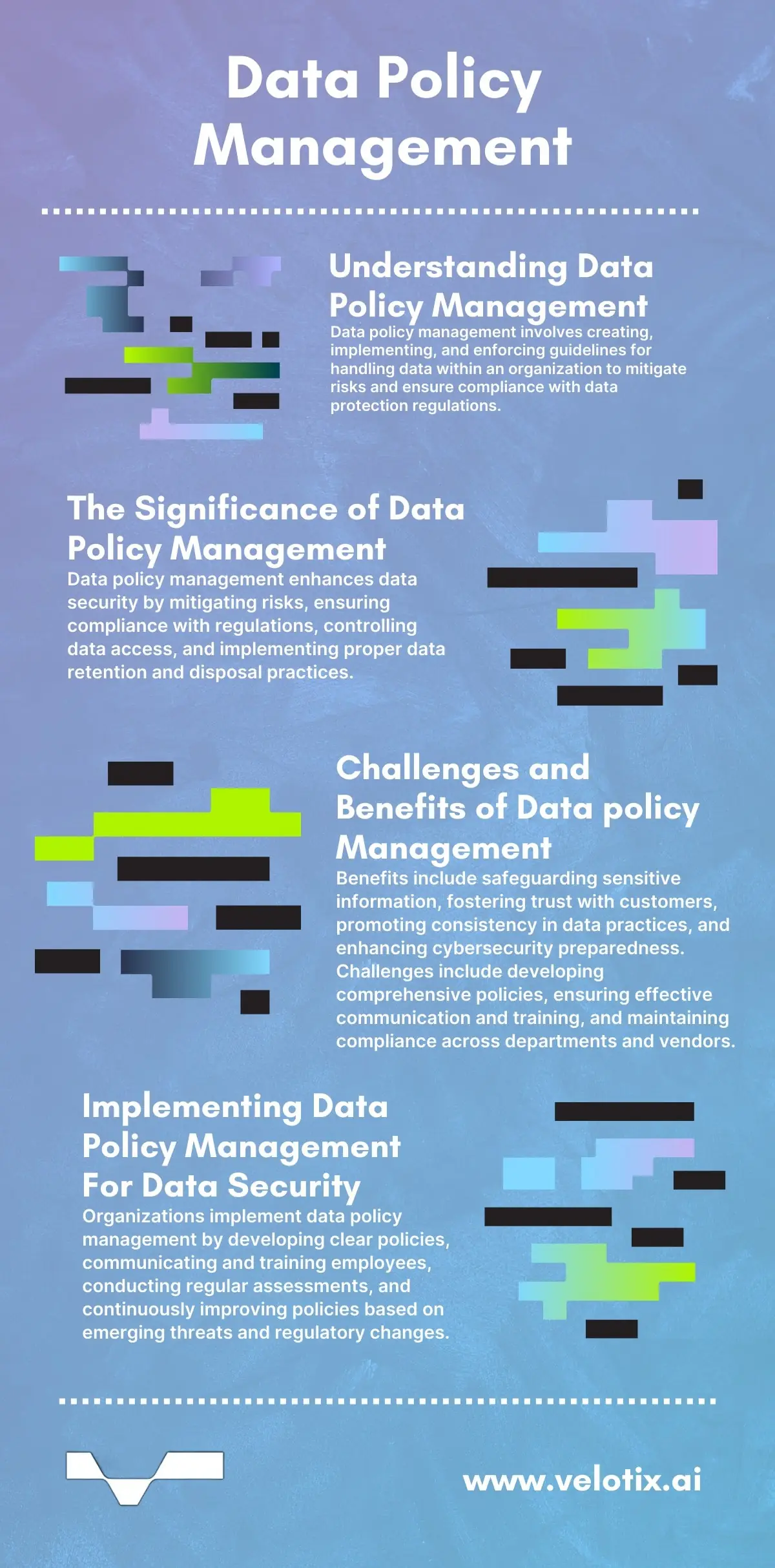Data policy management plays a critical role in governing data-related practices and mitigating risks associated with data breaches and misuse.
What is Data Policy Management?
Data policy management refers to the systematic approach of creating, implementing, and enforcing a set of guidelines and rules that govern the collection, storage, usage, sharing, and disposal of data within an organization. It is a fundamental aspect of data security, aimed at safeguarding sensitive information, maintaining data integrity, and ensuring compliance with data protection regulations.
Effective data policy management involves developing clear and comprehensive data policies tailored to the organization’s specific security needs and legal requirements. These policies outline data handling procedures, access controls, data classification, encryption, data retention, and disposal practices. They are communicated to all employees, stakeholders, and third-party vendors, with regular training sessions to ensure understanding and adherence. Data policy management includes risk assessments to identify potential vulnerabilities and threats to data security, enabling the organization to prioritize areas for enhanced protection. It also involves implementing access controls, encryption, and data masking techniques to limit data exposure and maintain data privacy during non-production activities. By continuously monitoring and auditing data activities, data policy management allows for proactive identification and mitigation of security gaps or unauthorized access.

The Significance of Data Policy Management in Data Security
The significance of data policy management in data security lies in its role as a comprehensive framework that ensures the protection, integrity, and confidentiality of sensitive information within an organization. Data policy management is crucial for enhancing data security by:
- Mitigating Risks: Identifying and mitigating potential data security risks and vulnerabilities through clear data handling procedures and access controls.
- Ensuring Compliance: Complying with data protection regulations like GDPR, HIPAA, and industry-specific laws to protect privacy rights and prevent legal liabilities.
- Controlling Data Access: Defining access rights and privileges to minimize the risk of insider threats and unauthorized access.
- Proper Data Retention and Disposal: Implementing data retention and disposal procedures to reduce data clutter and maintain data relevance.
- Data Classification: Classifying data based on its sensitivity to apply appropriate security measures.
What are the Challenges and Benefits of Data Policy Management?
Benefits of Data Policy Management
Data policy management offers numerous benefits to organizations in the realm of data security and compliance. Firstly, it provides a structured framework to safeguard sensitive information, reducing the risk of data breaches and unauthorized access. Clear guidelines for data handling, access controls, and data retention ensure data integrity and confidentiality. Compliance with data protection regulations, such as GDPR and HIPAA, fosters trust with customers and shields the organization from legal liabilities.
Data policy management enables better data governance, promoting consistency and standardization in data-related practices across the organization. Moreover, it enhances cybersecurity preparedness by fostering a culture of awareness among employees and stakeholders. By continuously improving data policies based on evolving threats and incidents, organizations can stay at the forefront of data security measures.
Challenges of Data Policy Management
Despite its benefits, data policy management comes with challenges that organizations must navigate. One significant challenge is the complexity of developing comprehensive data policies that align with various regulatory requirements and industry standards. Ensuring effective policy communication and training to educate all personnel about their roles in data security can also be challenging. As data volumes grow exponentially, data policy management may struggle to keep pace with emerging threats and vulnerabilities, requiring regular risk assessments and updates. Balancing the need for data security with the necessity of data accessibility for legitimate business purposes can be another delicate challenge.
Additionally, ensuring third-party vendors comply with data policies requires diligent monitoring and contractual agreements. Lastly, maintaining data policy compliance across all departments and geographies within a large organization can be a logistical challenge, necessitating central oversight and coordination to achieve consistency. Overcoming these challenges requires a proactive and collaborative approach, emphasizing continuous improvement and adaptability.
Implementing Data Policy Management for Data Security
Data security organizations implement data policy management for data security through a well-defined and systematic approach. The process involves several key steps to establish, enforce, and continuously improve data policies. To leverage the full potential of data policy management, organizations must:
- Develop Clear Policies: Create comprehensive data policies tailored to specific needs and compliance requirements.
- Communicate and Train: Ensure all employees and stakeholders understand their roles in maintaining data security through policy communication and training.
- Conduct Assessments: Regularly assess risks and audit data policies to identify vulnerabilities and evaluate effectiveness.
- Continuously Improve: Refine and enhance data policies based on emerging threats, regulatory changes, and incident learnings.
Data policy management is a critical component of effective data security and compliance. By establishing clear guidelines for data handling, access controls, and risk mitigation, organizations can protect sensitive information, maintain compliance with data protection regulations, and build trust with customers and stakeholders. As data continues to be a driving force in business operations, the importance of robust data policy management in safeguarding data integrity and privacy remains paramount.
In summary, data policy management is a vital practice for data security, ensuring that sensitive information remains protected, data handling is consistent, and compliance is maintained, fostering trust with customers and stakeholders.